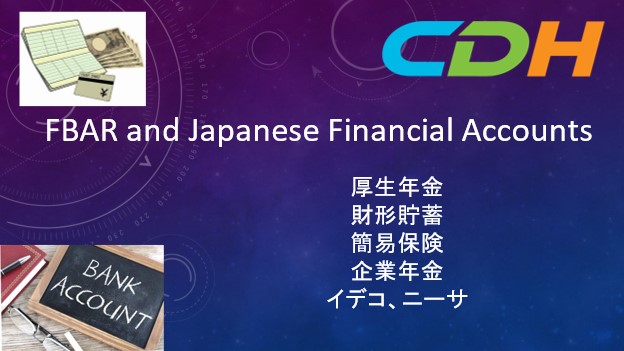By Koh Fujimoto
Cross Border Individual Tax Practice

Per the Bank Secrecy Act, you must report certain foreign financial accounts every year by filing a Report of Foreign Bank and Financial Accounts (FBAR) on Form 114. There are numerous unique financial accounts in Japan, and one may omit to report those accounts. In this article, I pick the most commonly asked financial accounts in Japan for FBAR reporting.
- Kosei Nenkin (厚生年金)
Kesei Nenkin provides the Employees’ Pension Insurance (EPI). It is one of the major public pension systems in Japan. Although this is an individual account, you do not have to include Kosei Nenkin in your FBARs because the Japanese government owns this account.
- Zaikei Chochiku (財形貯蓄)
Zaikei Chochiku is an abbreviation of the Employee Assets Accumulation Saving (勤労者財産形成貯蓄). Employees contribute a specific portion of their wages to a saving account by receiving assistance from employers. Zaikei qualifies as a reportable financial account for FBAR.
- Kani-hoken (簡易保険) or Kanpo (簡保)
The Japan Post office was a part of government entity before privatization. Its insurance business is commonly called Kampo. Kani-hoken refers to the insurance products offered by Kanpo Seimei, the current name of the insurance business entity. If your Kani-hoken is a financial interest, you must report the value of Kani-hoken to FBAR.
- Kigyo Nenkin (企業年金)
Certain employers provide their pension plans besides public pension programs to their employees. You must report the value of your private pensions to FBAR.
- iDeCo, NISA
Individual-type Defined Contribution pension plan is iDeCo, and Nippon Individual Saving Account is NISA. They are similar to the U.S. IRA and Roth IRA in their concepts. In short, they are qualified individual pension accounts governed by the Japanese government. They are financial accounts. Therefore, you must report these to FBAR.
When you report these accounts, you must identify the maximum balances of the year by eliminating duplication by netting the transfers between accounts. Then, you translate the Japanese yen to the U.S. dollar using the treasury department’s year-end exchange rate.
CDH provides tax filing services for individuals living in the U.S. and strives to resolve and explain their various problems and questions every day. In addition, these people’s issues are complex and wide-ranging, including U.S. and Japanese tax laws, immigration laws, life insurance, and retirement rules. I intended to make this article as easy as possible to understand the points of complex tax laws and regulations. So there are many exceptions. If you take action, consult with a tax and legal professional.
I produce Japanese videos on the same topic on YouTube. Would you please search at CDH 会計事務所? We also offer free consultations. Would you please make a reservation from this link? If you have any questions by e-mail, we will meet you and answer them.
https://outlook.office365.com/owa/calendar/[email protected]/bookings/
If you would like to subscribe to CDH’s newsletter, please visit https://www.cdhcpa.com/login/.
